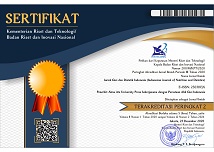ANALYSIS OF MENU PLANNING, CONSUMPTION ENERGY DENSITY RELATIONSHIPS AND FOOD LEFTOVERS OF THE ELDERLY NUTRITIONAL STATUS IN SOCIAL ORPHANS
Abstract
Background: The most important thing in giving food to the elderly is that the food served must meet the nutritional needs, the food served is given regularly in small portions but often, the food must be gradual and varied so as not to cause boredom, the food must be according to doctor's instructions for certain elderly and food must be soft. The elderly who live in the Werdha Nursing Home are faced with a different situation than before they lived in an orphanage. This causes the elderly to make adjustments so that their needs can be fulfilled. Health conditions in the elderly stage are largely determined by the quality and quantity of nutritional intake.Objective: This study aims to determine the analysis of menu planning, the relationship of energy consumption density and food waste to the nutritional status of the elderly at the Social Home Method: This study was an observational study of cross-sectional study design. Sampling was done by purposive sampling technique with a total of 50 elderly respondents. Bivariate analysis using Chi-Square statistical tests. Results: Planning the menu at the Social Home is carried out once a year with a seven-day menu cycle compiled by a Puskesmas Nutritionist and has a menu structure consisting of the frequency of feeding 3 main meals and 2 interludes. The application in feeding has not been adjusted to the menu made by a Nutritionist. Most respondents were aged 60-74 years (elderly). Correlation test results showed that there was no relationship between energy consumption density with the nutritional status of the elderly ( p = 0.589 ) (p> 0.05) and there was a relationship between food waste and the nutritional status of the elderly (p = 0.010 ) (p <0.05). Conclusion: Some menu planning at the Social Institution was carried out and some did not meet the factors that influenced menu planning at the institution. There is a relationship between food waste with the nutritional status of the elderly, the main factor affecting nutritional status is food intake. This is because not only because of the small amount of food left (<20%) which causes the risk of malnutrition, but there are other factors based on the questions and the results of the MNA score.
Keywords
Full Text:
PDFReferences
Proverawati A, Wati EK. Ilmu Gizi Untuk Keperawatan dan Gizi Kesehatan. Yogyakarta: Maha Medika; 2010.
Darmojo B. Buku Ajar Boedhi-Darmojp Geriatri. Jakarta: Balai Penerbit FK UI; 2009.
Depkes RI. Pedoman Pelatihan Kader Kelompok Usia Lanjut Bagi Petugas Kesehatan. Jakarta; 2003.
Arisman. Buku Ajar Ilmu Gizi, Gizi Dalam Daur Kehidupan, Edisi 2. Jakarta: EGC; 2009.
Sumiyati N. Hubungan Antara Tingkat Konsumsi Energi dan Protein dengan Status Gizi Pada Lansia di Panti Werda Pucang Gading. 2007.
Purwaningtiyas S. Gambaran Penyelenggaraan Makan di Pondok Pesantren Al-Qodiri Kabupaten Jember. Universitas Jember; 2013.
Andriani M, Wirjatmaji B. Pengantar Gizi Masyarakat. Jakarta: Kencana Prenada Media Group; 2012.
Kemenkes RI. Pedoman Pelayanan Gizi Seimbang. Jakarta; 2013.
Ekaningrum AY, Sukandar D, Martianto D. Keterkaitan Densitas Gizi, Harga Pangan, Dan Status Gizi Pada Anak Sekolah Dasar Negeri Pekayon 16 Pagi. J Gizi dan Pangan. 2017;12(2):139–46.
Maillot M, Darmon N, Darmon M, Lafay L, Drewnowski A. Nutrient-dense food groups have high energy costs: An econometric approach to nutrient profiling. J Nutr. 2007;137(7):1815–20.
Ledikwe JH, Blanck HM, Khan LK, Serdula MK, Seymour JD, Tohill BC, et al. {A figure is presented}Low-Energy-Density Diets Are Associated with High Diet Quality in Adults in the United States. J Am Diet Assoc. 2006;106(8):1172–80.
Yao M, Roberts SB. Dietary energy density and weight loss. Nutr Rev. 2001;59(8):247–58.
Soekirman. Ilmu Gizi dan Aplikasinya. Jakarta: Direktorat Jendral Pendidikan Tinggi Departemen Pendidikan Nasional; 2000.
DOI: http://dx.doi.org/10.21927/ijnd.2020.8(2).80-86
Refbacks
- There are currently no refbacks.

This work is licensed under a Creative Commons Attribution-ShareAlike 4.0 International License.
Indonesian Journal of Nutrition and Dietetics (IJND) indexed by:
 View My Stats
View My Stats



12.png)


























